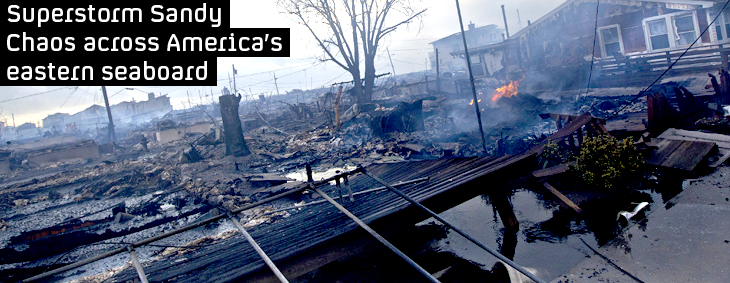Superstorm Sandy: back to politics as usual?
President Obama is touring the disaster zone – Mitt Romney is back to campaigning. Less than a week before the election, will the super storm, and the response, affect the vote?

No-one expected this – a monster storm that sent politics into a state of suspended animation, just days before the tightest election for years. Campaigning, at least by the candidates themselves, was put on hold. President Obama, back in the White House, took charge of disaster relief.
Now, as the enormous challenge of cleaning up the mess and calculating the loss begins, is there a sense that the campaign is returning to normal? And the big question is will super storm Sandy affect the way people vote?
In one way, the hurricane response was a reminder of the bigger issues, after weeks of partisan spats – although neither side pulled any of their negative political ads from swing states, even those affected by the storm.
But it has provoked a deeper discussion about Romney and Obama as leaders, and their beliefs on the role of government versus individual efforts to help the country out of trouble.
I am not going to play politics with this issue, this is so much bigger than an election. New Jersey governor Chris Christie
President Obama, who flew from Florida straight to a series of briefings in the Situation room as the scale of the disaster began to take hold, called governors of the worst hit states and promised all the federal help at his disposal. This, he said, was no time for red tape or bureaucracy: helping those in danger came first.
New Jersey’s Republican governor Chris Christie, lavish in his praise for the president, insisted Obama had been “outstanding to deal with.” And, he went on: “I am not going to play politics with this issue, this is so much bigger than an election.”
Big government, small government?
Mitt Romney, who hastily converted a planned election rally on Tuesday into a ‘disaster relief’ canned food drive, has been less clear about his support for the Federal Emergency Management Agency (Fema), suggesting funding should be diverted to state authorities instead.
At the Kettering Ohio event, he declared that individual charitable efforts could show the way forward, appearing to compare the post-Sandy response to cleaning up a football field.
Mr Romney, who like many of his fellow Mormons has a long record of pitching in to help those in need, exhorted supporters: “one of the things I’ve learned in life is you make the difference you can. You can’t always solve the problems yourself, but you can make the difference in the life of one or two people.”
If this is a moment when a battered nation is looking to its government, Romney’s individual charity line could look seriously out of kilter: the kind of volunteering that clears football fields or collects boxes of canned goods at a local hall, hardly scales up to the stage of a vast natural disaster.
And there were even some Republicans who felt their candidate should have held back from anything that smacked of political campaignig. Jon Weaver, who managed Jon Huntsman’s failed bid to become the republican presidential nominee, tweeted on Monday: “The campaigns should suspend tomorrow as well. And cancel these ‘storm relief collection’ events in swing states. C’mon.”
Three days in, and the Romney campaign has officially returned to the trail – the former Governor has three events in Florida, while his running mate Paul Ryan is all over his home state of Wisconsin. Obama aides have let it be known that the President will resume his campaigning on Thursday, touring Colorado, Nevada and Wisconsin.
But don’t be fooled into thinking that all campaigning was suspended during the super storm: even if the candidates weren’t out there, their surrogates were on the stump. Joe Biden was in Florida, Bill Clinton in Minnesota, Paul Ryan stayed on the road for the Republicans.
And for all the talk of pulling together as a nation, negative ads on both sides kept running in key television markets, including states affected by the storm. The only relief, perhaps, for those left without power, was that their televisions stayed silent.
The campaign must go on
There is no disaster prediction model for how all this will affect next Tuesday’s election. For the president, who has been all over the headlines looking, well, presidential, this could be a huge boost, as long as he doesn’t put a foot wrong.
Wednesday is no exception, as Obama makes a second visit to FEMA headquarters, then tours the New Jersey disaster zone, promising help and meeting victims, alongside a leading Republican. All Romney can promise is to maintain a “positive” tone in his Florida campaign events.
There are some pitfalls for the Democrats too: albeit more practical ones. Anything which might hinder voters, early ones or otherwise, from making it to the polls might seriously dent turnout, a crucial plank of their strategy.
All those cancelled swing state rallies for the last three days have not only knocked a key part of the ground campaign off course but also the headlines, now dominated by images of destruction and loss and the sheer wrath of nature.
Heading into the final weekend, the GOP has revealed its final push: a “Romney-Ryan Real Recovery Road Rally, an eleven state tour involving a hundred top level Republicans. Obama will be heading for western states on Thursday, well away from the storm.
But with polling suspended during the storm, it is still too soon to tell whether any of this has changed voters’ minds: or indeed, whether politics even seems quite so important, given what’s happened.
For all the unpredictability of a hurricane, the electoral impact is more unpredictable yet.
Felicity Spector writes about US politics for Channel 4 News
